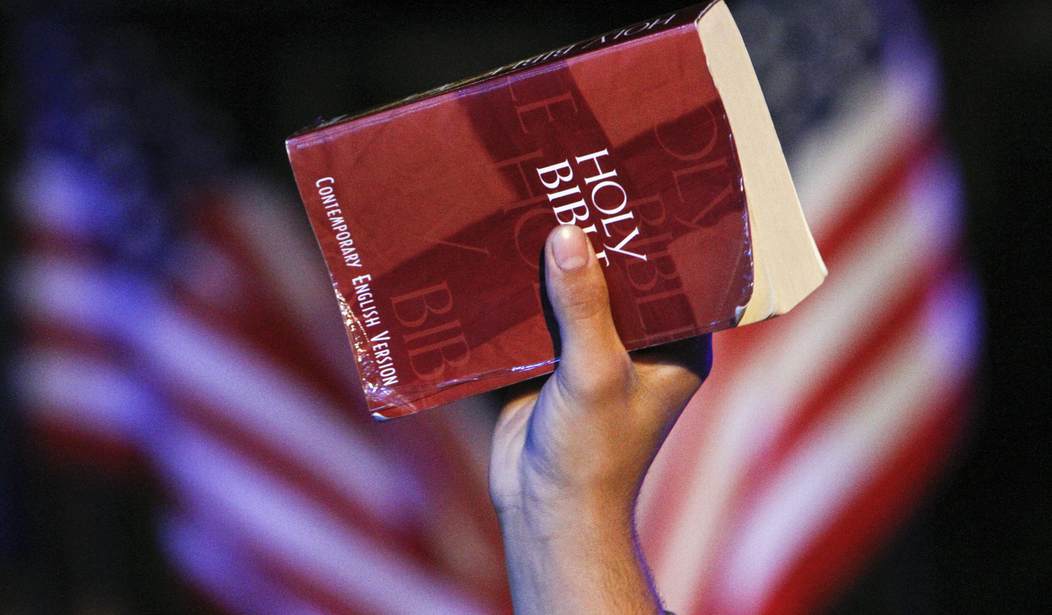The announcement of the Antisemitism Awareness Act passing the House generated quite a stir across Twitter/X, with many on the right claiming the bill, if signed into law, would criminalize Christianity.
Let's break down what the bill does, its origins, and the criticism.
I’m proud that my bill, the Antisemitism Awareness Act, just passed the House of Representatives 320 to 91. This bill has broad, bipartisan support and will begin the process of cracking down on the antisemitism we’ve seen run rampant on college campuses across America. pic.twitter.com/1Dik83m5d0
— Congressman Mike Lawler (@RepMikeLawler) May 1, 2024
The bill was sponsored by GOP congressman, Mike Lawler, who was quickly met with backlash upon announcing the passage of the bill in the House.
I’m not Jewish you moron!
— Congressman Mike Lawler (@RepMikeLawler) May 1, 2024
Lawler, a Catholic, was met with anti-Jew comments as well as those who see it as a legal assault on Christians' ability to speak about their faith.
No and those pushing that nonsense are truly idiotic and irrational. The bill does not criminalize Christianity — I’m Catholic. It’s gives contemporary examples of potential antisemitism. Calling all Jews Christ killers is a form of antisemitism. Believing in the gospel is not.
— Congressman Mike Lawler (@RepMikeLawler) May 2, 2024
Lawler rejected this objection, which was also raised by other members of Congress, including the firebrands, Matt Gaetz and Marjorie Taylor Greene.
This evening, I will vote AGAINST the ridiculous hate speech bill called the “Antisemitism Awareness Act.”
— Rep. Matt Gaetz (@RepMattGaetz) May 1, 2024
Antisemitism is wrong, but this legislation is written without regard for the Constitution, common sense, or even the common understanding of the meaning of words. The… pic.twitter.com/HYg2LJDLAI
Antisemitism is wrong, but I will not be voting for the Antisemitism Awareness Act of 2023 (H.R. 6090) today that could convict Christians of antisemitism for believing the Gospel that says Jesus was handed over to Herod to be crucified by the Jews.
— Rep. Marjorie Taylor Greene🇺🇸 (@RepMTG) May 1, 2024
Read the bill text and… pic.twitter.com/Y0eeOiVfnw
So who is right? Well, that's a tricky question and the answer likely falls in the territory of 'both and neither'.
(Disclaimer: This editor is an evangelical Christian and the understanding of the related topics and opinions below will reflect that.)
To address the question of Christian teaching we need to understand the often sticky question of 'who killed Jesus?' The reason it's a sticky question is that Congressman Lawler is right in this respect: The 'Christ-killers' accusation has been used at various times throughout history by those who hated the Jews.
It's not exactly a deeply intellectual line of attack, and could be thought of in the same vein as a person pointing at white Americans in 2024 and calling them 'slave keepers'. We don't blame people in the present for the actions of others in the past.
Despite these abuses, the answer to the question requires an understanding of the Christian faith and teachings.
First, the creeds, such as the Apostle's Creed and the Nicene Creed, which provide the fundamental set of beliefs to which a person must subscribe to be considered a Christian only state that Jesus was crucified 'under Pontius Pilate', a Roman. Are the creeds wrong? Of course not, they simply provide a historical record, and the matter of 'who killed Christ' was not sufficiently important to mention in the creeds.
The technical answer to the question is the Romans killed Jesus, exactly as the Bible describes. It is also undeniable Christian teaching that Jesus was handed to the Romans by the Jewish religious leaders of the day who asked that he be crucified for blasphemy. So, yes, basic Christian teaching is that the Jewish leaders played the primary role in condemning Jesus, leading to his crucifixion.
That is the portion of the argument where it is understandable that Christians would be alarmed that the text of the bill might make it illegal to state basic Christian teaching.
The real Christian answer to the question of who killed Jesus, by the way, should be 'we all did'. God allowed him to be killed and Jesus did so willingly so that we all could be saved from sin and death.
So where does the bill stand currently?
The bill hasn’t been passed
— (((Aaron Walker))) (@AaronWorthing) May 2, 2024
And it is not a criminal law that they are proposing
I oppose the bill, but that’s all it is right now: a bill.
That being said, right now under the civil rights act of 1964, if you are motivated by the belief that Jews killed Christ and this has… https://t.co/P85JNZaFO8
According to Twitchy's own Aaron Walker, and legal expert:
… right now under the civil rights act of 1964, if you are motivated by the belief that Jews killed Christ and this has something to do with Jews who live today, that is anti-Semitism with or without this amendment and if you act on it, you are likely to face liability in your company.
While it is definitely true that the 'Christ-killer' slur has been used by antisemites to attack Jews, it's also not unreasonable for Christians to be concerned that the right combination of lawyer and left-leaning judge could interpret a completely innocent action to be discrimination under Title VI because a person stated basic Christian teaching publicly at some point.
This is, frankly, a specific instance of the larger problem of 'hate crime' legislation. It puts the state in the position of mind-reading rather than punishing acts.
It went from being “Christ is King is anti-Semitic” to “Christianity is anti-Semtitic” real quick.
— Chief Trumpster (@ChiefTrumpster) May 2, 2024
Shame on everyone who let this happen and told us to accept it. pic.twitter.com/z7t4pQeSLx
Again, either of these statements can be used (and are) in an antisemitic manner (think, 'CHRIST IS KING, JEW!!!'), but they are innocent enough outside that context.
So how did we get here and whose 'fault' is it?
The bill is H.R.6090 - Antisemitism Awareness Act of 2023. Yes, 2023. This has been in the works for some time.
What the bill actually does is make the International Holocaust Remembrance Alliance (IHRA) Working Definition of Antisemitism the definition of antisemitism used when evaluating Title VI cases. The 'contemporary examples of antisemitism' listed in this definition include the exact text that has caused such an uproar:
Using the symbols and images associated with classic antisemitism (e.g., claims of Jews killing Jesus or blood libel) to characterize Israel or Israelis.
This is not a new definition. It is the definition from 2016 that has been used for this purpose by the Department of Education since 2018. This bill seeks to make it the legal definition for investigating Title VI violations, across the board.
This definition, however, has already been used for this purpose because President Trump decreed it to be so with Executive Order 13899 (Combating Anti-Semitism). The text of President Trump's Executive Order is very similar to the text of H.R. 6090, including the reference to the 'contemporary examples of antisemitism'.
So, who let this happen to us? President Trump and Congress, and there's no reason to believe either intended to criminalize Christianity. Both were attempting to address rising antisemitism and were largely opposed by leftist groups who often criticize Israel.
That's a lot of background, but what do we make of the bill? Well, opinions will vary, but clearly, many conservatives are concerned about the potential for abuse against people's First Amendment rights.
The Antisemitism Awareness Act is flagrantly unconstitutional under the First Amendment, and the members of Congress who vote for it are shamelessly violating their oath to support and defend the Constitution. https://t.co/x4KiH9igyq
— Justin Amash (@justinamash) May 1, 2024
Thomas Massie lays out some of the best objections to the bill and the dangers of depending on a definition that is not codified into law.
🧵 Today the House will vote on a bill to define antisemitism with the intent to increase prosecutions of activity on campuses.
— Thomas Massie (@RepThomasMassie) May 1, 2024
The bill has a problem beyond violating the 1st Amdt:
The definition of antisemitism appears no where in the bill!
Why?https://t.co/5A0alnuuOp
🧵 To find the legally adopted definition of antisemitism, one must go to this website below.
— Thomas Massie (@RepThomasMassie) May 1, 2024
Not only is the definition listed there, but one also finds specific examples of antisemitic speech.
Are those examples made part of the law as well?https://t.co/wbKGNsAGoD
Do you agree with all of these examples of antisemitism? Should people in America be prosecuted for saying these things in all contexts? I think not. This is a poorly conceived unconstitutional bill and I will vote no. pic.twitter.com/L3AI5MCFGw
— Thomas Massie (@RepThomasMassie) May 1, 2024
Reasonable people can conclude that the construction of the bill and the potential for abuse warranted greater scrutiny, and there is always the objection that criminalizing 'hate speech' (which was not even the primary concern here) is a slippery slope.
Chip Roy voiced that objection as well as providing a probable scenario that led to this confusion: The final passage of the bill was rushed through the House to try to capitalize on the recent anti-Israel protests across the country.
“The ability of the government to police thought, to police speech…”
— Rep. Chip Roy Press Office (@RepChipRoy) May 1, 2024
“You are empowering that which should never be empowered!"
🔥🔥🔥 pic.twitter.com/SmDEj9B0gI
Setting aside the hysterics, there are fundamental questions here about letting the government police language and legitimate concerns by Christians who don't want the law to be weaponized against them for holding mainstream beliefs.
Much of this trouble could have probably been avoided by simply working harder on the legislation, but there's still time to fix it.

























Join the conversation as a VIP Member